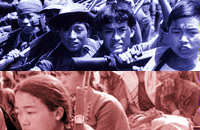|
Nepal's
Civil War
|
 |
 |
Nepal
Supporting Peace Processes Through a Systemic Approach |
September
2005
| Study
prepared for the Berghof Foundation for Peace Support |
 |
by
Dev Raj Dahal
Analysis
of the Current Situation Latent, manifest and violent conflicts have now
integrated with the ongoing evolutionary development of the Nepalese societal
system thus drastically changing the framework condition of the polity.
The utter inability by political parties to reconcile to the necessary
social change, and assimilate it with the polity and the state, allowed
the creation of a tension between the "critical mass" formed within sub-systems
of the society struggling for power, resource and identity and the hegemony
of the political class claiming to represent democracy, nationalism and
the state.
It was this tension that the Communist Party of Nepal (Maoist)
quickly learned to capitalize on and began calling the shots in the Nepalese
political life- not just changing the head of government at their will
but even governments.
The main actors in the macro-political conflict in
Nepal are: Communist Party of Nepal-Maoist (CPN-M), an alliance of seven
political parties1 and the government which is now headed by the King.
The armed insurgency started by the CPN (Maoist) since February 13, 1996
and the counter-insurgency operations by the state have caused serious
human rights violations, led to the death of more than 15,500 people-many
of them noncombatants, displaced over 200,000 and crippled public life
to such an extent that multiparty politics has been pushed to margins.
Conflict-affected women and men suffer from trauma, rape, harassment, torture
and arbitrary detention. The government remains preoccupied with national
security and law and order because of the widespread violence undermining
the very base of policy reforms so essential for poverty alleviation.
Apart
from the disruption in the fabric of social life even the delivery of the
supply of food and essential relief materials to victims in remote areas
has been negatively affected. Nepal's primitive development infrastructure
remains a primary target of the insurgency. This has resulted in the breakdown
of education, business and the farm based subsistence economy. It has caused
the exodus of rural people to urban areas and abroad, embroiled discontented
groups into even more protracted conflict and eroded whatever political
trust there was in peace efforts.
|





